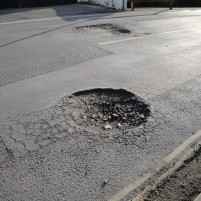Should California charge for driving on roads?
January 19, 2016
California drivers are bearing the burden of the state’s transportation funding crisis, with the average driver spending more than $500 a year to repair the wear and tear on their vehicle caused by bad roads. Gas tax revenues currently fund most of the state’s road maintenance and repairs, but gas tax revenues are declining as cars become more fuel efficient and as drivers adopt hybrids and electric vehicles. Caltrans estimates the funding gap to be about $5.7 billion per year for the state highway system alone.
Unless we address the transportation funding shortfall immediately, the funding gap will only widen. Lawmakers are working on a short-term solution to maintain our roadways and we will have to depend on the gas tax for the immediate future. However, gas tax revenues will continue to fall behind our transportation funding needs over the longer term. We must ultimately find a new transportation funding model that better reflects today’s realities.
One potential solution is the road charge. Under a road charge system, drivers pay by the mile rather than by the gallon. Whether you drive a gas-guzzling truck or an all-electric sedan, the road charge is the same per mile. Everyone pays their fair share. Several other states are already testing the road charge concept, and we must explore it further in California to determine if it is the right solution for us.
The state has already taken steps to begin exploring a road charge system. Senate Bill (SB) 1077, signed into law last year, requires California to study the feasibility of a road charge in a statewide pilot that includes a variety of volunteers from all regions of the state. To help ensure the parameters of the pilot meet California’s unique needs, SB 1077 also established a Technical Advisory Committee (TAC) to design the pilot with the benefit of robust public input. The TAC includes experts in telecommunications, data security and privacy, as well as highway users, business and consumer advocates, elected officials and academic researchers.
In 2015 the TAC conducted a robust stakeholder outreach process to seek feedback and input on the design of the pilot. The TAC held 12 public meetings throughout California and invited residents all over the state to attend a meeting or comment through the TAC’s website. Additionally, the TAC invited over 400 stakeholder groups and 130 elected officials to participate in the process, and it consulted a Road Charge Work Group made up of representatives from local government, vehicle manufacturers, fuel distributors and highway users.
After carefully reviewing all of the feedback and input gathered, the TAC released its final recommendations for the design of the pilot in early January. Some of the highlights of those recommendations are that the pilot should:
· Give drivers multiple options to report miles driven
· Provide non-technological options for those who choose to report their miles manually
· Protect driver privacy and personal data
· Measure the impact of a road charge on rural and urban drivers
· Require no cost to participate
The pilot is now scheduled to launch this summer and aims to recruit 5,000 participants that reflect the geographic, demographic and socioeconomic diversity of the state.
Because it has been rigorous, this endeavor gave us the opportunity to carefully examine and develop a set of recommendations that reflect the unique nature of our state. While we know the current gas tax system will not keep pace with state and national needs in the future, we also know the development and implementation of a sustainable long-term solution will take time to deliver. That is why we should all do our part by signing up for the pilot. Together, we can help the state determine if paying by the mile is the right transportation funding solution for California.
For more information visit www.CaliforniaRoadChargePilot.com.
Jim Madaffer is the Chair of the Road Charge Technical Advisory Committee and a member of the California Transportation Commission.







The comments below represent the opinion of the writer and do not represent the views or policies of CalCoastNews.com. Please address the Policies, events and arguments, not the person. Constructive debate is good; mockery, taunting, and name calling is not. Comment Guidelines